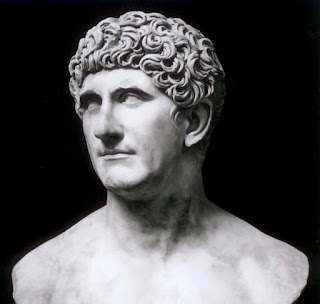 |
| Augustus Caesar |
I do not want to get bogged down in the semantics of the modern race for the Republican nomination for President of the United States, but the situation did remind me of yet another similarity between the USA and ancient Rome.
Their is one more similarity between the two that could mean that Augustus would win the Republican nomination. The fear of the foreigner. It is something that Augustus would be not be a stranger too. It could be argued that Augustus rose to his role as the first emperor of Rome due to his manipulating the fears of Rome against the east. The foreign. The strange. The different. The other.
Towards the end of the second Triumvirate, the Republic was split between Octavian (Augustus' name at the time) in Rome and the west and Mark Antony in the east. Mark Antony after being defeated in his campaign against Parthia, had to turn to Cleopatra for new men to replenish his forces. Sending away his Roman wife, the sister of Octavian, he took Cleopatra as his mistress. This lead to Octavian accusing Antony of being un-Roman for rejecting his Roman wife for his "Oriental paramour".
"As for Octavia, she was thought to have been treated with scorn, and when she came back from Athens Caesar ordered her to dwell in her own house"
After the forces of Antony captured the kingdom of Armenia in 34 BC, Anthony made his son Alexander Helios the ruler of Armenia. Not a Roman senator, a pro-consul or military tribune. The province was annexed and brought under the rule of Antony's own family. Cleopatra was also awarded the title of "Queen of Kings". When Augustus became Consul again in 33 BC, he opened his session in the Senate by attacking Mark Antony for his granting of land and titles to his family. The act of a "foreign" ruler, not a Roman.
"These were the charges they made against each other and were in a way their justification on their conduct, and they communicated them to each other partly by private letters and partly by public speeches on the part of Caesar"
 |
| Mark Anthony |
The final act of Mark Antony's fall from Roman-ness, came upon the reading of his will. Octavian Augustus forced open the temple of the Vestal Virgins (in itself a particularly egregious act) and took Antony's will. Within was the knowledge that Anthony planned to give away Roman territory to his children for them to rule and designated Alexandria as the site for his and his queens burial.
"He had the will which Antony had left in Rome, naming his children by Cleopatra among his heirs, opened and read before the people"
All of these acts are contrary to Roman ideals and mores, but what makes them impressive is the way Augustus plays up the fact that it is the "foreign" the "other" that is the threat. Mark Antony was a war hero, the saviour of th
e Republic after the Battle of Phillipi, a member of the second Triumvirate, a leader of Rome. Simply turning people against Mark Antony would not of been easy at all. It would of come across as a naked power grab.
e Republic after the Battle of Phillipi, a member of the second Triumvirate, a leader of Rome. Simply turning people against Mark Antony would not of been easy at all. It would of come across as a naked power grab.
However, by playing on the fear of the foreign, of the wicked eastern queen, the power of the unknown, Augustus was able to galvanise the Roman senate and people (granted not all of them) against Mark Antony for his own ends. It is arguable that Augustus could use these techniques in the modern world to win the USA election. Although this is not an issue linked to the USA alone, arguably the "migrant crisis" of Europe cause see the same results in any number of European countries.
Augustus was a consummate politician and I am greatly in awe of him and everything that he was able to do, converting the republic into an empire, however there is no denying that Augustus used the power of fear in his rise to power.
Thanks for Reading
James
